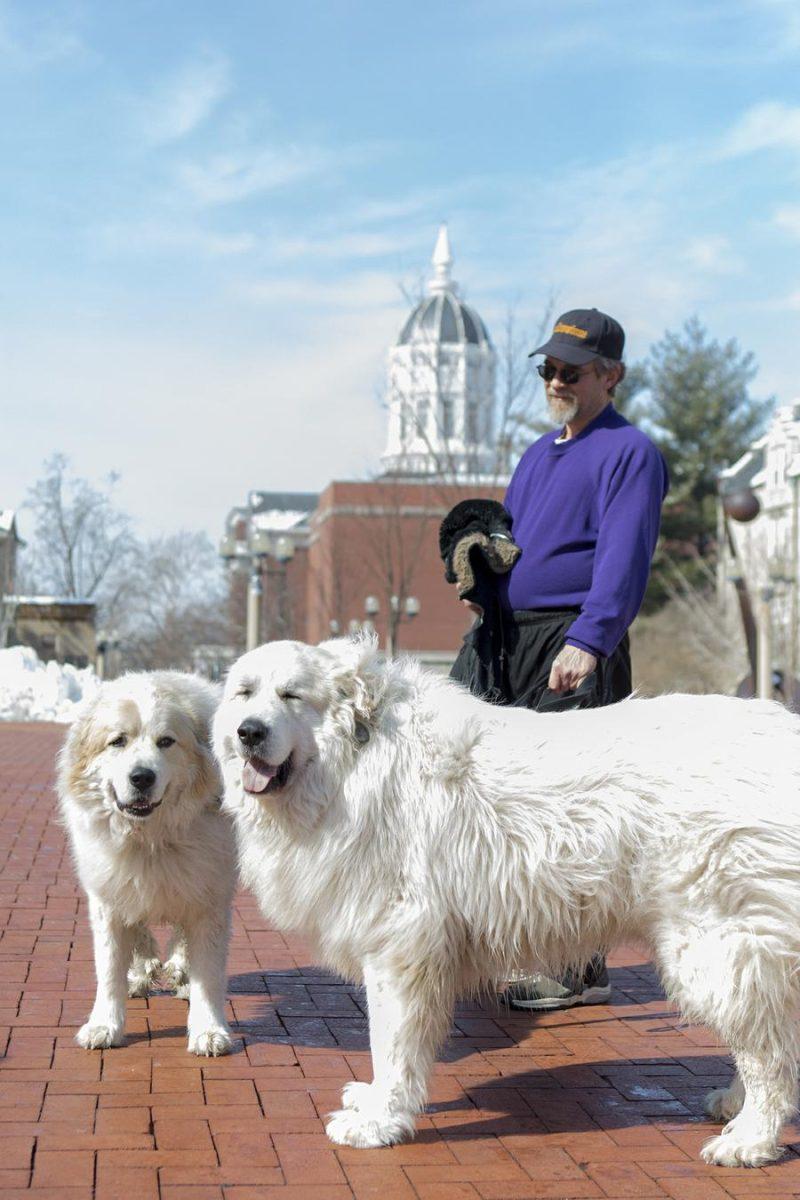Cris Wood is no stranger to big dogs.
It all started with Zeek, a Newfoundland he bought in the ’80s. Zeek was followed by Annie, a Labrador. Raleigh came next, the first of four Great Pyrenees that Wood would own.
After his second Pyrenees, Chester, died, Wood only owned Harry.
“My wife wanted another one,” he said.
And so Harlan entered the family, joining Harry and Ester, Wood’s cat.
Not to be mistaken for polar bears, the Great Pyrenees dogs Harry and Harlan are regulars on campus as they frequently stop at Speakers Circle for a break in their daily walks. These breaks are a treat for the animal-starved students as Wood is nice enough to let them pet Harry and Harlan.
“They’re the best kind of dog there is, so it’s obvious why I got them,” he said. “They’re really super smart, they’re real calm, they’re one of the best kind of dogs you can have around children. Besides the exercise, they don’t need a lot of big space to hang out.”
When he got them as puppies, Harry and Harlan each weighed around 15 to 16 pounds. Wood said while he misses how cute they were as puppies, handling full-grown dogs is much easier.
“You think it’s nice until they tear your stuff up or crap on the floor,” he said.
Now Harry, at seven years old, has grown to weigh 135 pounds. Three-year-old Harlan is even heavier, weighing 165 pounds.
As for feeding 300 pounds worth of hunger, Wood said it isn’t as difficult as people usually think. On average, he tends to buy a bag of food for each dog every month.
“I’ll have people with two teenage boys ask me if I’m spending a fortune on food,” Wood said. “Nothing compared to those growing teenage boys you have there. They’re always like, ‘Oh yeah. They’re eating me out of house and home.’”
Even though they may look similar, Wood said each dog has their own personality, with younger Harlan pawing for attention as Harry lounges in the sun. Overall, the two are fairly calm, Wood said.
“They sleep 20 hours a day and they’re ready for action the other four,” Wood said. “When we get home from a walk, they’re pretty tired. It takes a while, but we try and get in two or three miles a day so they’re ready for vacation.”
Having lived in Columbia since 1976, Wood knows all the best places to take the dogs.
Wood came to Columbia after serving in the army. Under the GI Bill, he was able to study engineering at MU, but left school and took on jobs like pipe fitting and sheet metal work.
“I wasn’t good enough at math for engineering, but I was good enough to do what the engineers needed,” Wood said.
Wood is currently a university employee on long-term disability leave after he broke an ankle eight years ago. His other ankle deteriorated from overuse. Wood worked in maintenance, making sure air conditioners and heating systems worked in every building.
“I couldn’t do the standing up and walking all day long anymore,” Wood said. “Running up and down stairs, there was just so much I could do. Even though I walk quite a bit (with the dogs), I don’t walk very fast.”
It was only last year that Wood started bringing Harry and Harlan to campus regularly. While he’ll encounter the occasional passerby with a fear of dogs, he said most people come up to them full of smiles.
“(People) always say how nice looking they are, even though they’re really pretty much a mess,” Wood said. “Harry rolls in dirt all the time, so his nickname ‘Dirty Harry’ fits him really good.”
For students like sophomore Jake Schnierow, seeing the dogs as he walks past Speakers Circle has become a welcome treat.
“When I first saw them, I thought it was cool that someone was walking their dogs around campus,” Schnierow said. “But after I saw them day after day, I thought this has to be some sort of routine he does where he brings them every day.”
Freshman Rebecca Stone, unable to keep dogs in her dorm, had to leave her two terriers home in Austin, Texas, and said she is reminded of them when she sees Harry and Harlan.
“I only get to see my dogs during break,” Stone said. “There aren’t really any animals I can pet in the dorms. The biggest thing I can pet is a chinchilla. Not having anything to cuddle with is hard.”
To Schnierow, the dogs have become a part of Speakers Circle, much like the travelling preachers or apartment advertisers, although better received.
Wood has been told many times that his dogs offer a temporary cure for pet withdrawal. Harry and Harlan have many friends on campus, he said, and he constantly receives comments on making people’s day.
“Might as well let people pet them,” Wood said. “No point in having these dogs and not sharing them.”








